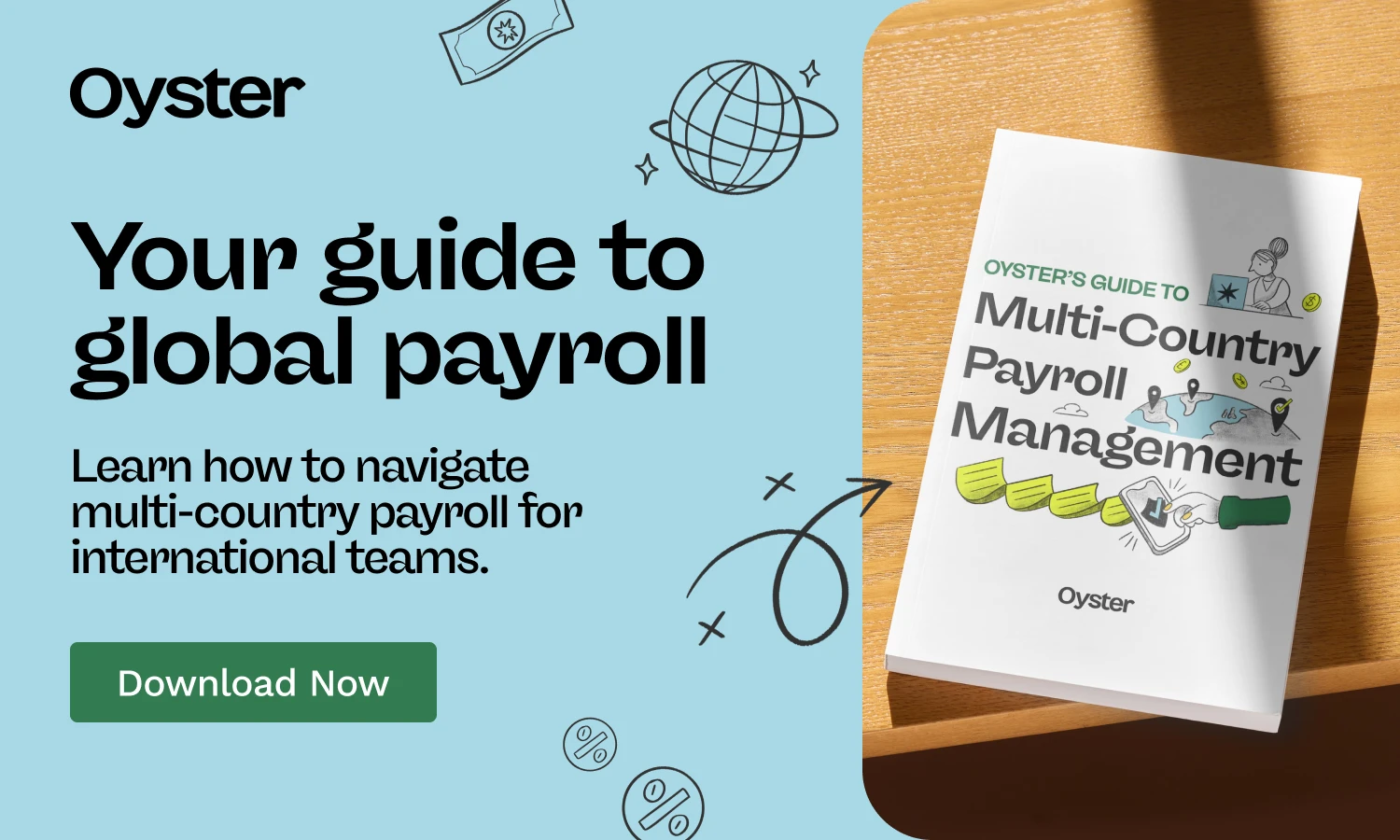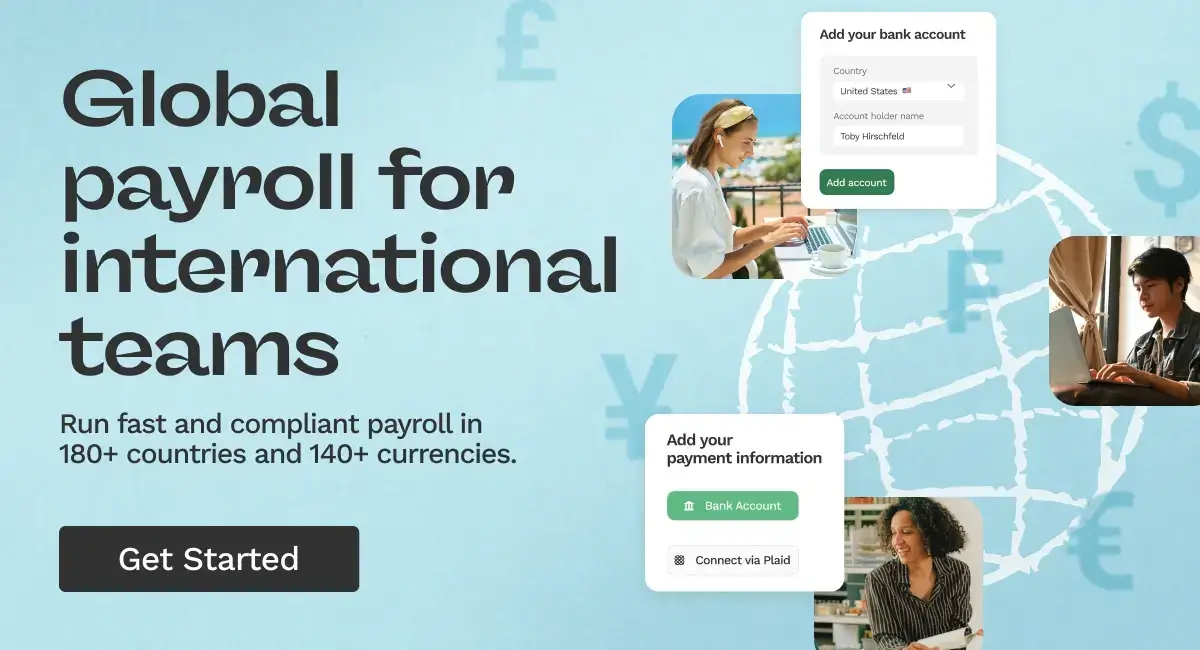What is a payroll service provider?

Payroll provider
Payroll is about more than signing a check—it's how businesses manage tax compliance, benefits contributions, and reporting for every employee on the team. Whether you have five people or five hundred, payroll management quickly becomes a complex, high-stakes task.
Managing payroll internally means juggling tax updates, deductions, compliance checks, and tight deadlines—often all at once. A payroll service provider lightens that load by automating the process.
This article explains what outsourced payroll providers do and how they help companies stay compliant, reduce errors, and simplify payments for distributed or global teams.
What is a payroll service provider?
A payroll service provider is a third-party company that manages payroll for businesses. Instead of handling it manually, companies outsource it to providers who process employee pay, calculate and withhold taxes, file with authorities, and ensure workers receive the correct payment at the right time.
Here's what a comprehensive payroll service provider might offer:
- Gross-to-net calculations for each employee
- Withholding and payment of payroll taxes
- Direct deposit or payment setup
- Issuance of payslips and year-end tax documents
- Reporting for finance and HR teams
- Integration with accounting or HR software
- Compliance with local tax and labor laws
- Support for multi-country payroll, when applicable
Why use a payroll service provider?
Managing payroll in-house can be challenging as headcount grows or your team expands across borders. A third-party payroll service provider reduces that complexity.
Here are a few key reasons a company might outsource payroll:
- Time savings: Payroll includes tracking hours, filing taxes, and staying on top of changing laws. A provider automates these processes, freeing up your HR and finance teams to focus on more strategic work.
- Compliance expertise: Tax rules vary by region. Payroll service providers help you stay compliant by applying up-to-date local laws, managing filings, and reducing the risk of costly errors or audits.
- Cost control: Payroll providers aren't free, but for many companies, the time and cost savings make up for the price. Outsourcing reduces manual tasks, prevents compliance mistakes, and can eliminate the need for a full-time payroll department.
These benefits compound for distributed or fast-scaling teams, making a payroll provider not just helpful but essential.
Types of payroll services
Not all payroll services do the same thing, and the right solution can look very different depending on your company's size, structure, and location. Here are four common types of payroll services plus ideal use cases.
Employer of record (EOR) services
An EOR handles payroll, tax withholdings, and compliance for international hires without requiring you to set up a local entity. The EOR becomes the legal employer, managing contracts, benefits, and contributions in line with local labor laws. An EOR is best for businesses hiring and managing global talent without an in-country entity or legal presence. It’s also ideal for distributed teams or companies expanding into new markets.
Oyster's EOR solution lets companies hire and pay full-time employees in over 120 countries without setting up a local entity or navigating local employment laws.
Outsourced payroll providers
Outsourced providers handle payroll processing on your behalf. That includes calculating pay, withholding taxes, issuing payments, filing reports, and ensuring compliance. Some providers also manage benefits administration and time tracking.
This solution typically works best for small to mid-sized businesses that want a hands-off, full-service solution, especially if they don't have an internal HR or finance team. For example, a 50-person company without a dedicated payroll specialist might hire an outsourced provider to handle payroll across its U.S. and Canadian offices.
Payroll software platforms
Payroll software platforms give HR and finance teams a centralized dashboard to manage payroll. This software also includes employee self-service portals, so workers can view pay stubs, update personal info, or download tax documents without emailing HR. And some platforms offer built-in reporting features that give you visibility into payroll trends and costs over time.
These platforms automate repetitive tasks like time tracking, tax calculations, and benefits deductions. It’s a great option for both small businesses and larger firms who want automation with local control.
In-house payroll processing
With in-house payroll processing, the company runs payroll internally, usually using spreadsheets, accounting software, or a homegrown system. It allows for complete control but requires up-to-date tax knowledge and internal bandwidth.
In-house payroll processing can work for larger organizations with established finance departments or companies in industries with highly customized payroll needs. However, these organizations must have the tech stack and engineering and development teams to deploy the tech.
For example, a national company with 300+ employees and full-time HR, accounting, and IT teams might manage payroll internally to maintain tight control and integrate with internal systems.

Payroll service provider vs. payroll software: What's the difference?
Payroll service providers and payroll software streamline how employees get paid, but they differ in how hands-on you need to be.
With a payroll service provider, you fully outsource payroll, handing it off to a third party who handles everything from calculations to tax filings. This frees up People Ops and legal resources and reduces compliance risk. It's a hands-off solution for companies without the capacity or the desire to run payroll themselves.
Payroll software, on the other hand, gives your team direct control. You enter hours, bonuses, and deductions; the system does the math. It’s more affordable than outsourcing, but it still requires someone on your team to run payroll each cycle and stay on top of local tax rules. Some payroll software platforms offer automation and helpful features like employee self-service portals, but it’s still a process you must manage.
How to choose a payroll service provider
Outsourcing payroll is beneficial for People Ops, legal, and payroll teams managing compliance across locations.
Here are a few key aspects to consider:
- Compliance and tax expertise: Look for a payroll service provider with deep knowledge of payroll regulations in the countries where you operate. Mistakes in tax filings or deductions can lead to costly penalties, so you need a partner who keeps up with local laws and handles filings accurately and on time.
- Scalability and business fit: Your provider should support where your business will be tomorrow, not just where it is today. Whether adding contractors, expanding internationally, or hiring rapidly, choose a payroll provider that can scale with you and handle evolving needs without requiring a complete systems overhaul.
- Integration with HR and accounting tools: A provider that integrates your existing HRIS, accounting software, and time-tracking tools can save hours and reduce manual entry errors. Ask about integrations upfront to avoid slowdowns once you're up and running.
- Level of service and support: Beyond tech, service matters. Will you have a dedicated point of contact? Is support available when you need it across time zones? Strong support can make the difference when issues arise.
- Cost and pricing structure: Understand how you're being charged: per employee, per pay run, or flat rate. Transparent pricing helps you avoid surprises and ensures you’re paying for what you need, not extras you don’t use.
The right payroll provider should be a partner, not just another platform. Choose one that fits your growth plans and operational workflow.
Simplify payroll processing with Oyster
Managing payroll across borders doesn’t have to be complicated. Oyster is a global payroll provider built for modern HR teams that need to stay compliant, reduce manual tasks, and deliver accurate payments, no matter where their people work.
Need a complete solution? Oyster’s EOR service makes hiring and paying international talent simple. And Oyster’s Global Payroll service lets you pay distributed teams in local currencies across 30+ countries while keeping up with local tax rules and regulations.
For fast-growing companies ready to scale globally, Oyster helps HR teams stay ahead by making global payroll easy, automated, and fully compliant.
Book a demo to learn more.

About Oyster
Oyster enables hiring anywhere in the world—with reliable, compliant payroll, and great local benefits and perks.

Related Resources

.avif)

.avif)
.webp)
%20(1).webp)
